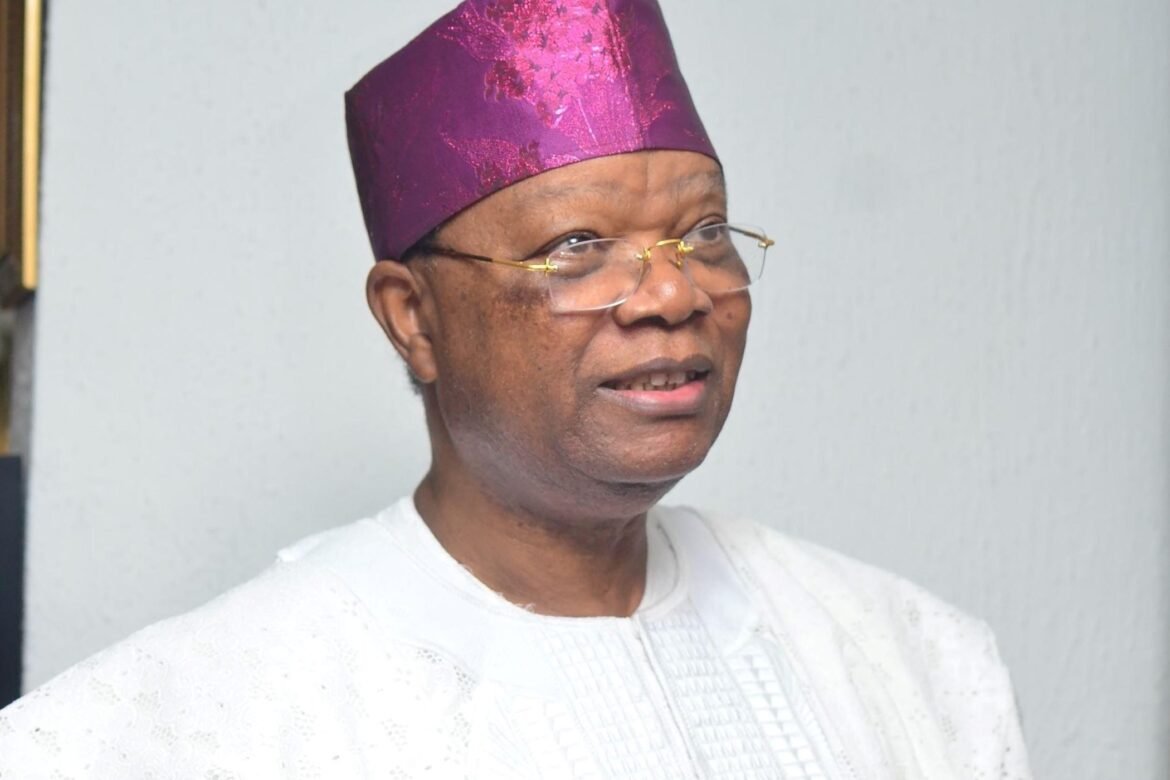The headline of the article in that edition of Sunday Times seemed audacious: It was all caps and entitled, “Youth with the world at his feet,” published 53 years ago, when I was two.
It was not about me, of course. It was about Prince Julius Adelusi-Adeluyi, who at 27, was already Secretary General of the International Students Organisation (ISO), a body comparable in its prime and transcendence to the Internet of Things, the modern-day religion of Mark Zuckerberg.
Outside the context of that time (August 13, 1967) the Sunday Times headline may not only appear audacious, it would even seem exaggerated.
In context, however, it was not.
The 1950s when ISO was formed and the 1960s were times of ferment and great social turbulence across the world.
For Prince Adelusi-Adeluyi, a black student, an African and a Nigerian to occupy a ranking position in a global student body at that time – a body which gave him the platform to visit over 60 other countries, speaking on the big stage and setting up branches – his position was not just a big deal, it was also significant conquest.
It was a parable, too.
A parable of what the young and daring can do today, without waiting to be told that they are the leaders of tomorrow.
Prince Adelusi-Adeluyi’s has been more than just a life of daring.
It has also been a parable of how a life that almost never was later became a life of quests, grace and extra-ordinary impact.
Juli Pharmacy, or Prince Juli, as he is fondly known, might not have been born. After five, his parents thought they had given up child-bearing, but he came anyway, exactly 80 years ago on Sunday, fair-complexioned like “oyinbo.”
His mother fell into labour on July 31, but he was not born until August 2 – two days later, almost confirming his parents’ worst fear that his conception had been a “mistake”.
After he survived the mistake of his birth, young Julius was taken to the Catholic mission at age five where he lived with missionaries for the next 20 years.
It has also been a parable of how a life that almost never was later became a life of quests, grace and extra-ordinary impact
It was while he was there that he learnt lessons that would guide him through his teenage years and well into adult life.
“I learnt orderliness, simplicity and discipline,” he said in a recent interview. “I was taught to pay attention to details and to realise that whatever is worth doing is worth doing well. I learnt that to be a person of character and service is better than to be a person of material wealth.”
The lessons lit his path, whether as Secretary General of ISO where he helped to set up branches in over 60 countries, rallying students from Holland to Yugoslavia and Kenya to take a stand and make their voices heard in their countries, or later in business where his pioneering effort as chairman of the indigenous business group of the Nigerian Stock Exchange tested his mettle to the limits.
Business of the Nigerian variety was nothing like what he had experienced in his exertions in student unionism at the then University of Ile-Ife, where he studied Pharmacy and even edited an irreverent magazine, Spitfire.
It was nothing like what he had seen in his stint in broadcasting either.
Or even what he would later learn from his remarkable years of service at Rotary International.
As Chairman of Juli Pharmacy, his pioneering role as chair of the indigenous business group of the NSE, was as much a test of his acumen and faith in the country as it was emblematic of why Nigeria remains a perpetual story of a potential in the making; ever aspiring, but never quite there.
Like most idealists, Prince Juli thought he could bring some of the lessons he had learnt on the global stage to bear on business in Nigeria.
So, he took his company, Juli Pharmacy, to the NSE as the first indigenous business to go public.
READ ALSO: My Bitter-Sweet Experience In Business – Prince Adelusi-Adeluyi Speaks At 80
To further deepen the indigenisation decree, which had been enacted over a decade and a half earlier, the military regime of General Ibrahim Babangida promised to restructure the Stock Exchange and expand the scope, impact and reach of indigenous companies.
Juli Pharmacy took the Babangida regime by its word.
The company had over 22 branches, far more than many indigenous businesses at the time could boast of.
It went public and raised over N100million (roughly N6billion by today’s value).
The shares were oversubscribed by five times its value and Juli Pharmacy ended up spending about N20m to return N400m, leaving the company effectively with N80m to start.
Three months after Juli Pharmacy went public, the regime introduced the Structural Adjustment Programme (SAP), making business hell for listed indigenous companies and wiping off Juli Pharmacy’s stock value by nearly 70 per cent overnight
Peter Olafioye, the Sunday Times reporter who wrote that young Julius had the world at his feet in 1967 should have been at the Exchange in 1986 when Chairman Juli rang the opening bell.
It seemed that after his conquests in student unionism and philanthropy, in Pharmacy and even his stint as a privately licensed pilot, Prince Juli would also take the business world by the scruff of the neck.
The military Vice President and second-in-command at the time, Vice Admiral Augustus Aikhomu, vowed that the regime would do whatever it took to support indigenous businesses.
He urged Juli Pharmacy to keep dancing, never to look back, promising that Babangida’s drumbeat would never stop.
But the beat stopped even before it started, and without warning.
Three months after Juli Pharmacy went public, the regime introduced the Structural Adjustment Programme (SAP), making business hell for listed indigenous companies and wiping off Juli Pharmacy’s stock value by nearly 70 per cent overnight.
He has looks that make his peers, and even younger ones, struggle to come to terms with his age; a flair for public speaking; a deep sense of humour; and a sense of fashion that leaves this rag-loving generation in shreds
The man who had the world at his feet suddenly needed a leg to stand on, a prospect which even today’s elite business schools would find difficult to unravel as a case study.
Prince Juli has extra-ordinary gifts.
I have been magnetised by his warmth since he first embraced me in a heart-hug after I gave a lecture at a Rotary event at the Airport Hotel, Lagos, 15 years ago.
He has looks that make his peers, and even younger ones, struggle to come to terms with his age; a flair for public speaking; a deep sense of humour; and a sense of fashion that leaves this rag-loving generation in shreds.
Until he turned his library over to the Obafemi Awolowo University (OAU, Ile-Ife), his alma mater, that personal treasure trove was one of the most resourced personal libraries I had ever seen.
His quest for knowledge drove him to study law even after he had become a successful and well-known pharmacist.
He finished Law School as the best graduating student, drawing both admiration and envy almost in equal measure.
He speaks Dutch, Spanish, Portuguese and French, a talent which has helped him build and maintain a vast network of contacts and drawn many, old and young, to his well-spring of wisdom. In conversation, he pays attention to each person with complete presence, as if nobody else but that person matters the most.
In his column in The Nation on Monday, Poet, Sam Omatseye, described Prince Juli as “the renaissance man”; and on Tuesday, master prose stylist, Dr. Reuben Abati, paid tribute to his humanity and prodigious gifts. The story continues.
He has been student activist, thought leader, mobiliser, bridge builder, businessman and minister of health, receiving accolades from past Nigerian leaders, including General Yakubu Gowon and twice from current President, Muhammadu Buhari.
Yet there appears to be one thing that he has struggled to understand, in spite of his prodigious gifts: how to crack the conundrum of poor policy implementation in Nigeria’s public life.
How can a country so abundantly gifted with glimpses of talent in the public sector and a vibrant and innovative private sector and civil society, fall so disastrously short in execution every time?
Prince Juli tried to tackle this problem in his thesis at the National Institute of Policy and Strategic Studies (NIPSS) Course 12, entitled, “Constraints of policy formulation and implementation in Nigeria”.
But 10 years on, the answer is still blowing in the wind.
Why is that nearly half a century after he became a student leader on the global stage, no Nigerian student has attained that height?
Why is it that in spite of repeated promises by Nigerian governments, in spite of papers, seminars and conferences with tomes of recommendations and volumes of stirring speeches, Nigerian businesses are still struggling to find a footing, just as it was when Juli Pharmacy enlisted on the Stock Exchange 34 years ago?
What is the consequential contribution of pharmacists in Nigeria – the apple of Juli Pharmacy’s eye – in finding solutions to the raging COVID-19 pandemic?
In one word, why can’t we get implementation right?
As Prince Juli marks 80 on Sunday, perhaps one of his great wishes would be a lasting answer to the conundrum of implementation.
That may well be one conquest that could bring the world to our collective feet.
Happy birthday, sir!








